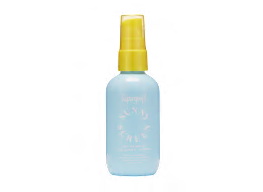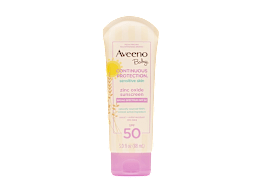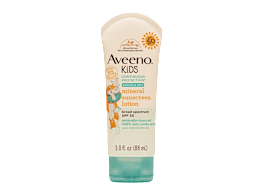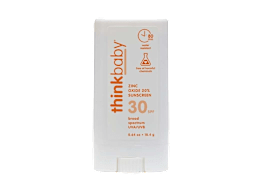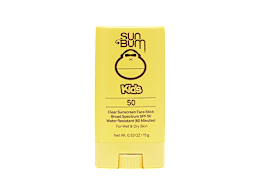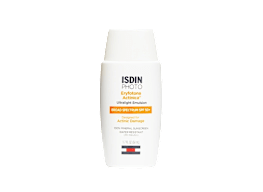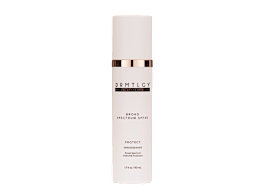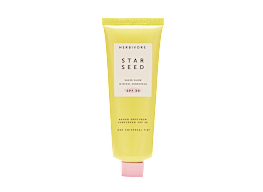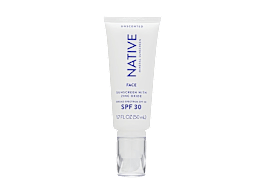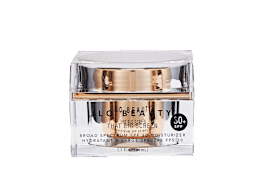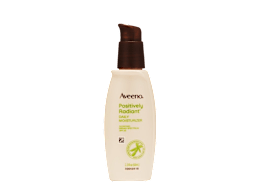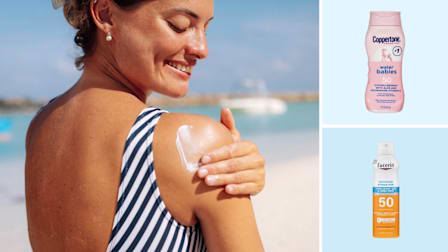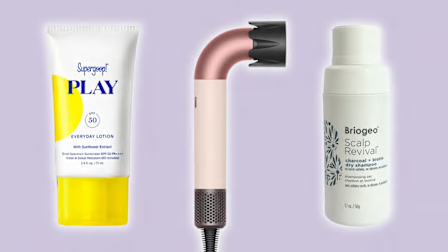Sunscreen for Dark Skin Is a Must
Having a darker skin tone gives you some natural protection against the sun’s rays, but shielding your skin is still the smartest choice
When you shop through retailer links on our site, we may earn affiliate commissions. 100% of the fees we collect are used to support our nonprofit mission. Learn more.

For those who think their skin color exempts them from having to worry about sun protection, dermatologists have a message: The sun’s damaging rays don’t discriminate. “Ultraviolet (UV) rays are color-blind, so they hit all skin with equal strength,” says Maritza Perez, MD, an associate clinical professor of dermatology at the Icahn School of Medicine at Mount Sinai in New York City.
“Darker skin contains more melanin [pigment that gives skin its color] than lighter skin, and that helps block the rays from penetrating and doing as much damage,” Perez says. “But even the darkest Black skin provides only about an SPF 13. If you get enough sun exposure, you’ll get skin damage, and possibly even skin cancer.”
And for those who identify as Black, Asian, or Hispanic but have skin on the lighter end of the spectrum, the risk might be nearly equal to that of many white people.
Sun, Sunburn, and Skin Damage
A history of sunburn is linked to a higher risk of developing skin cancer, and people of all ethnicities are susceptible to burning. A 2021 review showed that dark-skinned individuals still experience sun-induced effects to their skin, such as burning and peeling. Redness, the telltale sign of sunburn for white people, might not be as evident on darker skin, but skin can still feel hot, tight, and painful.
Skin-Cancer Risk
Asians, Blacks, and Hispanics do have a significantly lower incidence of skin cancer compared with white people. But they aren’t immune. For example, in a study published in the journal Cancer Causes & Control, Asian men who had the most sun exposure in childhood had a risk of developing squamous cell carcinoma (a type of skin cancer than isn’t usually fatal but can be disfiguring) that was about three times greater than those who got the least sun exposure. Among Asian women in the study, those who got the most sun over their lifetime had a risk that was about 4.5 times greater. And the rates of melanoma, a potentially fatal type of skin cancer, are still 1 in 167 for Hispanics and 1 in 1,000 for non-Hispanic Blacks, according to the American Cancer Society.
Skin cancer is often diagnosed at a later stage in people of color. That’s partly because of a lack of awareness about the risks and because skin cancer can look much different and be found in different places on the body (such as the palms and soles of the feet). “Even doctors often don’t think about skin cancer when they’re treating people of color,” Downie says. The outcome is that skin cancer can be harder to treat and, in the case of melanoma, be more deadly in nonwhites.
“I think perhaps the most important conversation to have around skin cancer is the disparities that exist within it,” says Jenna Lester, MD, director of the Skin of Color Clinic at the University of California, San Francisco. “Why are there such drastic differences between mortality rates even though skin cancer is much less common in Blacks, Hispanics, and Asians vs. in whites?”
See our evaluation of the 5 best sunscreens for people with dark skin.
Finding a Sunscreen That Suits Your Skin
In a 2022 American Academy of Dermatology survey of more than 1,000 adults, two-thirds of respondents claim that they often forget to reapply sunscreen.
People who have darker skin—and the slight protection that extra melanin provides—might be tempted to skimp. But even if you don’t burn and aren’t worried about skin cancer, sunscreen is the key to keeping skin healthy. “The bulk of the benefit to wearing sunscreen in patients with brown skin is that it helps minimize skin discoloration and premature wrinkling,” says Crystal Aguh, MD, director of the Ethnic Skin Program at Johns Hopkins School of Medicine in Baltimore. “Skin discoloration is among the most common complaints in patients with brown skin, and regular use of sunscreen is a critical component of the treatment regimen.” The American Academy of Dermatology recommends that everyone use a broad-spectrum sunscreen with an SPF of 30 or higher every day.
It’s important, too, to take other sun protective measures, such as covering up with clothing and a wide-brimmed hat, seeking shade, and whenever possible, avoiding the sun between 10 a.m. and 4 p.m. when it’s at its peak strength. This is the case no matter what your skin tone, but for people with darker skin, emerging evidence suggests that visible light from the sun—which isn’t filtered by sunscreen—plays a large role in pigment changes in the skin, according to a 2022 dermatology expert consensus panel on photoprotection published in the Journal of the American Academy of Dermatology.
One barrier to sunscreen use is finding one that works for your skin. “The biggest concern I hear from my patients with darker skin is about the cosmetic appearance of the sunscreen once it’s applied,” says Lester. “Too many products give their skin a light cast.”
For that reason, Lester suggests sampling less expensive drugstore brands so that you can try several options.
In CR’s sunscreen tests, our professional panel of sensory testers found that the following highly protective sunscreens in our ratings (listed in alphabetical order) left little film on skin and didn’t leave it looking chalky.
Some recent studies have called into question the safety of certain chemical active sunscreen ingredients, particularly oxybenzone. This UV filter can be absorbed through the skin, and there’s some evidence—all of it from animal studies—that it’s an endocrine disruptor, meaning it can mimic or interfere with the body’s own hormones.
Experts caution that this news shouldn’t dissuade you from using sunscreen. “We know that UV exposure is a risk factor for developing certain types of skin cancer, whereas we don’t know the implications of these studies yet,” Lester says.
An option is to seek out a natural sunscreen, which contains mineral ingredients such as titanium dioxide and zinc oxide that aren’t absorbed through the skin. But for people with darker skin, mineral sunscreens can leave them with a whitish, ashy tone. Plus, in CR’s testing, mineral sunscreens consistently rate lower for sun protection.

